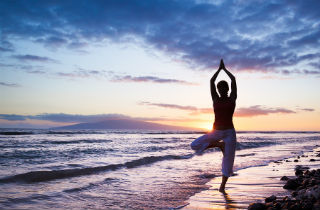The practice of yoga can be a lifelong help to those in addiction recovery. How? Can yoga teach you how to prevent relapse and stay sober? And where can you get started with a daily yoga practice? We explore here.
How does yoga help addiction recovery?
For the answer to this question, we sought the advice of Julien Gryp, the co-director and founder of a unique addiction recovery center in Thailand. A native of Belgium, Julien suffered from a drug addiction for more than 7 years. None of the western treatments worked and alternatives to AA recovery were few and far between. In 2004, his father drug him to Thamkrabok, a monastery in Thailand known for detox. After 30 days, his body was healed but his mind was still weak and miserable. Seeking a purpose in life, he ordained as a Buddhist monk and for 8 years studied insight meditation. To deepen his own practice, Julien studied yoga and attended mindfulness workshops. Julien sees the connection between recovery and yoga this way:
Addicts are out-of-control internally. The ancient Indian practice of yoga helps us create a peaceful union of body, mind and spirit. It increases physical and mental stamina. As we feel better, we’re less susceptible to the stresses of every day life and better able to resist the urges to escape into addiction.
Often when addicts first come to treatment centers, they’ve lived so far out of the present that meditation is hard, if not impossible. Yoga is a good tool to help learn to focus their awareness on breathing and then their bodies. It prepares them to move into true meditation.
What types of yoga should I practice?
The practice of “yoga” is actually an eight-fold approach to life. Much like the branches of the tree, each aspect of yoga practice is called a “limb”. In fact, the yoga that we know of in the West is actually the third limb of yoga called yoga asana (the yoga of postures). In the tradition, the practice of yoga postures is preceded by right living, ethics and dedication to a spiritual path.
That said, there are many asana yoga practices currently accessible. In the West, over one hundred types of yoga have been recognized. Your choice of yoga style will depend on your individual needs, history, and preferences. And your preferred yoga style may change with time. For example, some people prefer dynamic, power yoga in their 20’s and 30’s and then gravitate to flowing, subtle styles later in life. Some of the more popular types of yoga include:
- Anusara Yoga
- Astanga Yoga
- Bikram Yoga
- Iyengar Yoga
- Jivamukti Yoga
- Purna Yoga
- Sivananda Yoga
- Vinyasa Yoga
How to begin a yoga practice
In general, it’s best to begin a yoga practice under the supervision and guidance of a yoga teacher. It is important that your body alignment, particularly the spine, is correct. Injury can occur during yoga asana practice, particularly in the joints of the ankles, knees, shoulders and neck/spine. A good stretch in yoga is gentle muscular tension or pulling. A bad stretch in yoga can lead to muscle, ligament or tendon strain. It is important that you change positions gently, and without too much bother. Some beginning postures that might help get you re-acquainted with your body include:
Bound angle pose
Cobra pose
Mountain pose
Seated forward bend
Staff pose
Standing forward bend
Tree pose
Additionally, a yoga teacher can introduce you to breathing and mindfulness practices that you practice at the same time as you “hold” a posture. Breathing is very important (it is life!) and full, complete breathing is the aim of some techniques. It is important to observe the breathing, and make the connection between mind and body. A certified yoga teacher can do this. To learn more, check out this beginner’s guide for yoga from Yoga Journal.
Moreover, read this list of 18 benefits of yoga according to science made by Jen Reviews.
Yoga for addiction recovery questions
Do you still have questions, comments or suggestions about yoga for addiction recovery? Please leave them here! We respond to all questions with a personal and prompt reply.









Related Posts